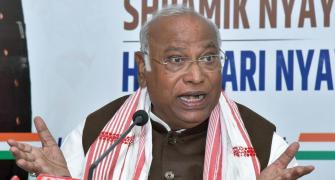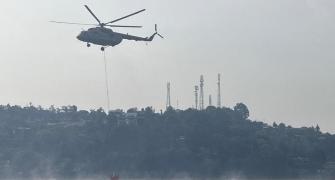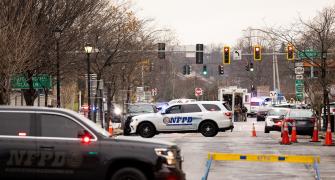Undeterred by the threats of retaliation from militants, the US intends to step up its drone strikes in Pakistan's tribal areas and may extend them deeper inside the country, a media report said today.
On Sunday, a Taliban leader vowed to unleash two suicide attacks a week, similar to Saturday's Islamabad blast, unless the CIA stopped firing missiles in the region. Pakistani officials have already expressed concern that the missile strikes fuel more violence in the country.
But the New York Times quoted US officials as saying that the plan to intensify missile strikes underscored President Obama's goal to "disrupt, dismantle and defeat" Al-Qaeda in Pakistan and Afghanistan, as well as to strike at other militant groups.
Officials are also proposing to broaden the strikes to Baluchistan, south of the tribal areas, unless Pakistan reduces the incursion of militants there, the report said.
Senator Carl Levin, a Michigan Democrat who heads the Armed Services Committee, acknowledged last week that "the price is very heavy" when missile strikes mistakenly kill civilians, but he said the strikes were" an extremely effective tool".
Some experts have said that a crucial change in aerial warfare, in which US forces are often stalking individuals rather than tanks and other large armaments, has raised new legal issues.
The paper also quoted military experts as saying that the drones which can transmit live video for nearly a day at a time, typically supply the weapons targeting officers with enough information to avoid civilian casualties.
Marc Garlasco, a former military official who now works for Human Rights Watch, has said the drones had helped limit civilian casualties in Afghanistan and Iraq, where the Air Force uses them to attack people laying roadside bombs.
In Pakistan, the missile strikes have been limited to the tribal areas, and authorities say they have killed 9 of the top 20 Qaeda leaders. US officials say the missile strikeshave forced some Taliban and Qaeda leaders to flee south towards Quetta, a city in Baluchistan bordering Afghanistan.
The final preparations for strikes in Pakistan take place in a crowded room lined with video screens, where CIA officers work at phone banks and National Security Agency personnel monitor electronic chatter, the paper said.
The intelligence officers watch scratchy video captured by the drones, which always fly in pairs above the targets.
Generally the head of the CIA's clandestine service or his deputy gives the final approval for a strike. The decision about what type of weapon to use depends on the target, a former intelligence official was quoted as saying.
Top security leaders approve lists of people who can be attacked and the lawyers determine whether each attack can be justified under international law, officials said.







